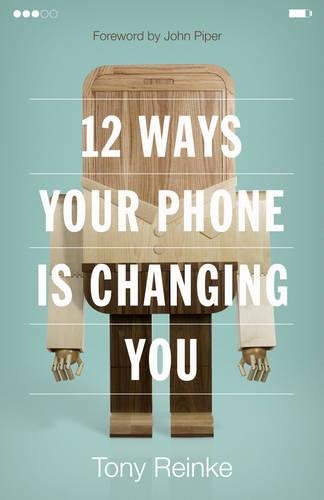A Brief Book Summary from Books At a Glance
by Nathan Sundt
About the Author
Tony Reinke is a journalist and serves as senior writer for desiringGod.org. He hosts the popular Ask Pastor John podcast and is the author of Lit! A Christian Guide to Reading Books and Newton on the Christian Life.
Overview
Tony Reinke’s book reacts to the fast-changing realities of technology and modern life while employing a biblical theology of technology and careful conceptual analysis not to overreact. The whiplash of modern technology can often be taken for granted in the psyche of the reader, so Reinke is careful to emphasize in his discussion how these technological changes recapitulate the sins, failings, and foibles of the human past—and point toward the redeemed future of Christ’s people.
Table of Contents
Foreward by John Piper
Introduction: A Little Theology of Technology
1 We Are Addicted to Distraction
2 We Ignore Our Flesh and Blood
3 We Crave Immediate Approval
4 We Lose Our Literacy
5 We Feed on the Produced
6 We Become Like What We “Like”
7 We Get Lonely
8 We Get Comfortable in Secret Vices
9 We Lose Meaning
10 We Fear Missing Out
11 We Become Harsh to One Another
12 We Lose Our Place in Time
Conclusion: Living Smartphone Smart
Epilogue
Summary
Chapter 1: We Are Addicted to Distraction
Reinke opens chapter 1 with statistics that shock and clarifies like a spritz of cold water: “We check our smart phones about 81,500 times each year, or once every 4.3 minutes of our waking lives, which means you will be tempted to check your phone three times before you finish this chapter.” He continues, “Our phones are addictive, and, like addicts, we seek hits immediately in the morning.” This technologically-assisted interconnectivity allows “hundreds of people… [to] interrupt us at any moment. And when we are bored, with the flick of a thumb we can skim an endless list of amusements and oddities online.”
Reinke probes the problem with three questions: “Why are we lured to distractions? What is a distraction? And, most foundational of all, what is the undistracted life?” The first question carries the main themes of the chapter and has three applicable conclusions: (1) “we use digital distractions to keep working away,” (2) “we use digital distractions to keep people away,” (3) “we use digital distractions to keep thoughts of eternity away.” Spiritually, this approach to life is building poor habits: we are slow to “associate with the lowly” around us. “Instead, we retreat into our phones—projecting our scorn for complex situations or for boring people in both cases. When we grab our phones, we air our sense of superiority to others—often without knowing it.”
The section is memorably encapsulated with a reference to Descartes: “The philosophical maxim, “I think, therefore I am,” has been replaced with a digital motto, “I connect, therefore I am,” leading to a status desire: “I am liked, therefore I am.” Reinke defines a distraction as something “that diverts our minds and hearts from what is most significant” and points out three categories in which to think of dangerous, unchecked distractions: (1) blinding souls from God, (2) closing off communion with God, (3) lessening the urgency of divine realities. . . .
[To continue reading this summary, please see below....]The remainder of this article is premium content. Become a member to continue reading.
Already have an account? Sign In
